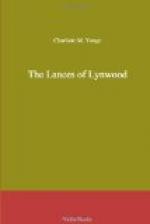The first red streak of dawn was beginning to glow in the eastern sky, when the note of a bugle rang out from the Prince’s tent and was responded to by hundreds of other horns. That instant the quiet slumbering camp awoke, the space in front of every tent was filled with busy men, arming themselves, or saddling their horses. Gaston and Eustace, already fully equipped, assisted Sir Reginald to arm; Leonard was roused, and began to fasten on his armour; the men-at-arms came forth from their tent, and the horses were saddled and bridled; “And now,” called Sir Reginald, “bring our last loaf, John Ingram. Keep none back. By this day’s eve we shall have abundance, or else no further need.”
The hard dry barley-bread was shared in scanty, but equal measure, and scarcely had it been devoured, before a second bugle blast, pealing through the camp, caused each mail-clad warrior to close his visor, and spring into the open plain, where, according to previous orders, they arrayed themselves in two divisions, the first commanded by the Duke of Lancaster and Sir John Chandos, the second by Prince Edward and Don Pedro.
After a pause, employed in marshalling the different bands, the host advanced at an even pace, the rising sun glancing on their armour, and revealing the multitude of waving crests, and streamers fluttering from the points of the lances, like the wings of gorgeous insects. Presently a wall of glittering armour was seen advancing to meet them, with the same brilliant display. It might have seemed some mighty tournament that was there arrayed, as the two armies stood confronting each other, rather than a stern battle for the possession of a kingdom; and well might old Froissart declare, “It was a pleasure to see such hosts.”
But it would be presumptuous to attempt to embellish a tale after Froissart has once touched it. To him, then, I leave it to tell how the rank of banneret was conferred on the gallant old Chandos, how the Prince prayed aloud for a blessing on his arms, how he gave the signal for the advance, and how the boaster, Tello, fled in the first encounter. The Lances of Lynwood, in the division of the Duke of Lancaster, well and gallantly did their part in the hard struggle with the brave band of French, whose resistance was not overcome till the Black Prince himself brought his reserved troops to the aid of his brother.
With the loss of only one man-at-arms, the Lances of Lynwood had taken several prisoners. It was high noon, and the field was well-nigh cleared of the enemy, when Sir Reginald drew his rein at the top of a steep bank clothed with brushwood, sloping towards the stream of the Zadorra, threw up his visor, wiped his heated brow, and, patting his horse’s neck, turned to his brother, saying, “You have seen sharp work in this your first battle-day, Eustace.”
“It is a glorious day!” said Eustace. “See how they hurry to the water.” And he pointed over the low shrubs to a level space on the bank of the river, where several fugitives, on foot and horseback, were crowding together, and pressing hastily forward.




